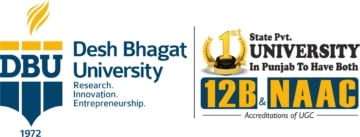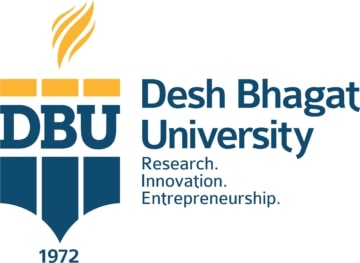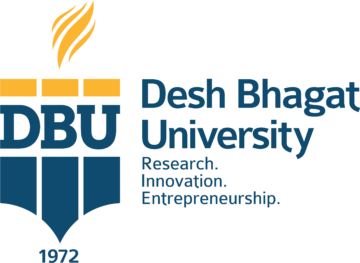Programme Objectives
January 4, 2023 2023-09-02 9:22Programme Objectives
Programme Objectives
Applied Sciences
M.Sc. Physics
Program Educational Objectives (PEOs):
PEO1 Fundamental Knowledge: to attain skills in the fundamental concepts of basic sciences necessary for success in industry or in engineering practices as well as advanced study.
PEO2 Specialization: prepare to pursue career choices in all branches of engineering or related interdisciplinary fields that will benefit from a strong background in applied sciences and engineering.
PEO3 Design Skills: to imbibe with problem solving skills, laboratory skills, and design skills for technical careers in solving critical problems.
Program Outcomes (POs):
PO1 Scientific Knowledge: To employ critical thinking and the scientific method to design not only with respect to science subjects but also in all aspects related to life.
PO2 Understanding and critical thinking: To demonstrate an understanding of major concepts in all disciplines of Science.
PO3 Problem analysis: To analyze the scientific data critically and systematically and the ability to draw the objective conclusions.
PO4 Design/development of solutions: To foster observation skills and drawing logical conclusions from the scientific experiments.
PO5 Conduct investigations of complex problems: To develop scientific temper to propose novel ideas in explaining facts and figures or providing new solution to the problems.
PO6 Scientist and Society: To cultivate rational outlook and analyze the results of experiments and get an awareness of the impact of Science on the environment, society, and other cultures outside the scientific community.
PO7 Environment and sustainability: To imbibe with new ideas for the sustainable developments.
PO8 Ethics and Responsibility: To nurture ethical, social and moral values in personal and social life paving a path to highly cultured and civilized personality.
PO9 Management and projects: Enhancing To acquire the analytical skills in handling scientific instruments, planning and performing in laboratory experiments.
PO10 Individual and Team Work: To apply knowledge and experience to foster personal growth and appreciate the diverse social world in which we live.
PO11 Modern tool usage: To provide technology-oriented skills, tools and ability to develop creative solutions and engage in continuing professional development.
PO12 Life-long learning: To attain the knowledge of subjects in other faculties such as humanities, performing arts, social sciences etc. can have greatly and effectively influence which inspires in evolving new scientific theories and inventions.
Program Specific outcomes (PSOs):
PSO1: To carry out experiments in basic as well as certain advanced areas of physics such as nuclear physics, condensed matter physics, nano science, lasers and electronics
PSO2: To build a scientific temper and to learn the necessary skills to succeed in research or industrial field.
PSO3: To be able to define and resolve new problems in Physics and participate in future development of Physics.
PSO4: To develop strong student competencies in Physics and its applications in a technology–rich, interactive environment
PSO5: Have necessary skills and expertise in field of research and development.
M.Sc. Chemistry
Program Educational Objectives (PEOs):
PEO1: Fundamental Knowledge: to attain skills in the fundamental concepts of basic sciences necessary for success in industry or in engineering practices as well as advanced study.
PEO2: Specialization: prepare to pursue career choices in all branches of engineering or related interdisciplinary fields that will benefit from a strong background in applied sciences and engineering.
PEO3: Design Skills: to imbibe with problem solving skills, laboratory skills, and design skills for technical careers in solving critical problems.
Program Outcomes (POs):
PO1Scientific Knowledge: To employ critical thinking and the scientific method to design not only with respect to science subjects but also in all aspects related to life.
PO2 Understanding and critical thinking: To demonstrate an understanding of major concepts in all disciplines of Science.
PO3 Problem analysis: To analyze the scientific data critically and systematically and the ability to draw the objective conclusions.
PO4 Design/development of solutions: To foster observation skills and drawing logical conclusions from the scientific experiments.
PO5 Conduct investigations of complex problems: To develop scientific temper to propose novel ideas in explaining facts and figures or providing new solution to the problems.
PO6 Scientist and Society: To cultivate rational outlook and analyze the results of experiments and get an awareness of the impact of Science on the environment, society, and other cultures outside the scientific community.
PO7 Environment and sustainability: To imbibe with new ideas for the sustainable developments.
PO8 Ethics and Responsibility: To nurture ethical, social and moral values in personal and social life paving a path to highly cultured and civilized personality.
PO9 Management and projects: Enhancing To acquire the analytical skills in handling scientific instruments, planning and performing in laboratory experiments.
PO10 Individual and Team Work: To apply knowledge and experience to foster personal growth and appreciate the diverse social world in which we live.
PO11Modern tool usage: To provide technology-oriented skills, tools and ability to develop creative solutions and engage in continuing professional development.
PO12 Life-long learning: To attain the knowledge of subjects in other faculties such as humanities, performing arts, social sciences etc. can have greatly and effectively influence which inspires in evolving new scientific theories and inventions.
Program Specific Outcomes (PSO):
PSO1: To carry out experiments in basic as well as certain advanced areas of Chemistry such as Organic Chemistry, Inorganic Chemistry, Analytical Chemistry, Physical Chemistry and Spectroscopy.
PSO2: To build a scientific temper and to learn the necessary skills to succeed in research or industrial field.
PSO3: To be able to define and resolve new problems in Chemistry and participate in future development of Chemistry.
PSO4: To develop strong student competencies in Chemistry and its applications in a technology–rich, interactive environment.
PSO5: Have necessary skills and expertise in field of research and development.
M.Sc. Mathematics
Program Educational Objectives (PEOs):
PEO1: Fundamental Knowledge: to attain skills in the fundamental concepts of basic sciences necessary for success in industry or in engineering practices as well as advanced study.
PEO2: Specialization: prepare to pursue career choices in all branches of engineering or related interdisciplinary fields that will benefit from a strong background in applied sciences and engineering.
PEO3: Design Skills: to imbibe with problem solving skills, laboratory skills, and design skills for technical careers in solving critical problems.
Program Outcomes (POs):
PO1Scientific Knowledge: To employ critical thinking and the scientific method to design not only with respect to science subjects but also in all aspects related to life.
PO2 Understanding and critical thinking: To demonstrate an understanding of major concepts in all disciplines of Science.
PO3 Problem analysis: To analyze the scientific data critically and systematically and the ability to draw the objective conclusions.
PO4 Design/development of solutions: To foster observation skills and drawing logical conclusions from the scientific experiments.
PO5 Conduct investigations of complex problems: To develop scientific temper to propose novel ideas in explaining facts and figures or providing new solution to the problems.
PO6 Scientist and Society: To cultivate rational outlook and analyze the results of experiments and get an awareness of the impact of Science on the environment, society, and other cultures outside the scientific commUnity.
PO7 Environment and sustainability: To imbibe with new ideas for the sustainable developments.
PO8 Ethics and Responsibility: To nurture ethical, social and moral values in personal and social life paving a path to highly cultured and civilized personality.
PO9 Management and projects: Enhancing To acquire the analytical skills in handling scientific instruments, planning and performing in laboratory experiments.
PO10 Individual and Team Work: To apply knowledge and experience to foster personal growth and appreciate the diverse social world in which we live.
PO11Modern tool usage: To provide technology-oriented skills, tools and ability to develop creative solutions and engage in continuing professional development.
PO12 Life-long learning: To attain the knowledge of subjects in other faculties such as humanities, performing arts, social sciences etc. can have greatly and effectively influence which inspires in evolving new scientific theories and inventions.
Program Specific Outcomes (PSO):
PSO1: To carry out experiments in basic as well as certain advanced areas of Mathematics such as Real Analysis, Algebra, Statistics, Linear Programming and Calculus.
PSO2: To build a scientific temper and to learn the necessary skills to succeed in research or industrial field.
PSO3: To be able to define and resolve new problems in Mathematics and participate in future development of Mathematics.
PSO4: To develop strong student competencies in Mathematics and its applications in a technology–rich, interactive environment
PSO5: Have necessary skills and expertise in field of research and development.





